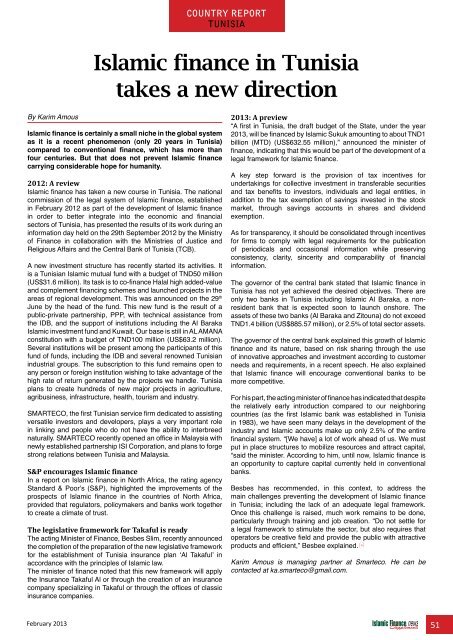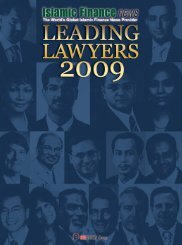View PDF Edition - Islamic Finance News
View PDF Edition - Islamic Finance News
View PDF Edition - Islamic Finance News
You also want an ePaper? Increase the reach of your titles
YUMPU automatically turns print PDFs into web optimized ePapers that Google loves.
country report<br />
TUNISIA<br />
<strong>Islamic</strong> finance in Tunisia<br />
takes a new direction<br />
By Karim Amous<br />
<strong>Islamic</strong> finance is certainly a small niche in the global system<br />
as it is a recent phenomenon (only 20 years in Tunisia)<br />
compared to conventional finance, which has more than<br />
four centuries. But that does not prevent <strong>Islamic</strong> finance<br />
carrying considerable hope for humanity.<br />
2012: A review<br />
<strong>Islamic</strong> finance has taken a new course in Tunisia. The national<br />
commission of the legal system of <strong>Islamic</strong> finance, established<br />
in February 2012 as part of the development of <strong>Islamic</strong> finance<br />
in order to better integrate into the economic and financial<br />
sectors of Tunisia, has presented the results of its work during an<br />
information day held on the 29th September 2012 by the Ministry<br />
of <strong>Finance</strong> in collaboration with the Ministries of Justice and<br />
Religious Affairs and the Central Bank of Tunisia (TCB).<br />
A new investment structure has recently started its activities. It<br />
is a Tunisian <strong>Islamic</strong> mutual fund with a budget of TND50 million<br />
(US$31.6 million). Its task is to co-finance Halal high added-value<br />
and complement financing schemes and launched projects in the<br />
areas of regional development. This was announced on the 29 th<br />
June by the head of the fund. This new fund is the result of a<br />
public-private partnership, PPP, with technical assistance from<br />
the IDB, and the support of institutions including the Al Baraka<br />
<strong>Islamic</strong> investment fund and Kuwait. Our base is still in AL AMANA<br />
constitution with a budget of TND100 million (US$63.2 million).<br />
Several institutions will be present among the participants of this<br />
fund of funds, including the IDB and several renowned Tunisian<br />
industrial groups. The subscription to this fund remains open to<br />
any person or foreign institution wishing to take advantage of the<br />
high rate of return generated by the projects we handle. Tunisia<br />
plans to create hundreds of new major projects in agriculture,<br />
agribusiness, infrastructure, health, tourism and industry.<br />
SMARTECO, the first Tunisian service firm dedicated to assisting<br />
versatile investors and developers, plays a very important role<br />
in linking and people who do not have the ability to interbreed<br />
naturally. SMARTECO recently opened an office in Malaysia with<br />
newly established partnership ISI Corporation, and plans to forge<br />
strong relations between Tunisia and Malaysia.<br />
S&P encourages <strong>Islamic</strong> finance<br />
In a report on <strong>Islamic</strong> finance in North Africa, the rating agency<br />
Standard & Poor’s (S&P), highlighted the improvements of the<br />
prospects of <strong>Islamic</strong> finance in the countries of North Africa,<br />
provided that regulators, policymakers and banks work together<br />
to create a climate of trust.<br />
The legislative framework for Takaful is ready<br />
The acting Minister of <strong>Finance</strong>, Besbes Slim, recently announced<br />
the completion of the preparation of the new legislative framework<br />
for the establishment of Tunisia insurance plan ‘Al Takaful’ in<br />
accordance with the principles of <strong>Islamic</strong> law.<br />
The minister of finance noted that this new framework will apply<br />
the Insurance Takaful Al or through the creation of an insurance<br />
company specializing in Takaful or through the offices of classic<br />
insurance companies.<br />
2013: A preview<br />
“A first in Tunisia, the draft budget of the State, under the year<br />
2013, will be financed by <strong>Islamic</strong> Sukuk amounting to about TND1<br />
billion (MTD) (US$632.55 million),” announced the minister of<br />
finance, indicating that this would be part of the development of a<br />
legal framework for <strong>Islamic</strong> finance.<br />
A key step forward is the provision of tax incentives for<br />
undertakings for collective investment in transferable securities<br />
and tax benefits to investors, individuals and legal entities, in<br />
addition to the tax exemption of savings invested in the stock<br />
market, through savings accounts in shares and dividend<br />
exemption.<br />
As for transparency, it should be consolidated through incentives<br />
for firms to comply with legal requirements for the publication<br />
of periodicals and occasional information while preserving<br />
consistency, clarity, sincerity and comparability of financial<br />
information.<br />
The governor of the central bank stated that <strong>Islamic</strong> finance in<br />
Tunisia has not yet achieved the desired objectives. There are<br />
only two banks in Tunisia including <strong>Islamic</strong> Al Baraka, a nonresident<br />
bank that is expected soon to launch onshore. The<br />
assets of these two banks (Al Baraka and Zitouna) do not exceed<br />
TND1.4 billion (US$885.57 million), or 2.5% of total sector assets.<br />
The governor of the central bank explained this growth of <strong>Islamic</strong><br />
finance and its nature, based on risk sharing through the use<br />
of innovative approaches and investment according to customer<br />
needs and requirements, in a recent speech. He also explained<br />
that <strong>Islamic</strong> finance will encourage conventional banks to be<br />
more competitive.<br />
For his part, the acting minister of finance has indicated that despite<br />
the relatively early introduction compared to our neighboring<br />
countries (as the first <strong>Islamic</strong> bank was established in Tunisia<br />
in 1983), we have seen many delays in the development of the<br />
industry and <strong>Islamic</strong> accounts make up only 2.5% of the entire<br />
financial system. “[We have] a lot of work ahead of us. We must<br />
put in place structures to mobilize resources and attract capital,<br />
“said the minister. According to him, until now, <strong>Islamic</strong> finance is<br />
an opportunity to capture capital currently held in conventional<br />
banks.<br />
Besbes has recommended, in this context, to address the<br />
main challenges preventing the development of <strong>Islamic</strong> finance<br />
in Tunisia; including the lack of an adequate legal framework.<br />
Once this challenge is raised, much work remains to be done,<br />
particularly through training and job creation. “Do not settle for<br />
a legal framework to stimulate the sector, but also requires that<br />
operators be creative field and provide the public with attractive<br />
consulting www.<strong>Islamic</strong><strong>Finance</strong>Consulting.com<br />
www.<strong>Islamic</strong><strong>Finance</strong>Events.com<br />
products and efficient,” Besbee explained.<br />
www.<strong>Islamic</strong><strong>Finance</strong><strong>News</strong>.com<br />
www.<strong>Islamic</strong><strong>Finance</strong>Training.com<br />
www.MIFforum.com<br />
www.MIFmonthly.com<br />
www.MIFtraining.com<br />
www.REDmoneyBooks.com<br />
Karim Amous is managing partner at Smarteco. He can be<br />
contacted at ka.smarteco@gmail.com.<br />
February 2013 51
















